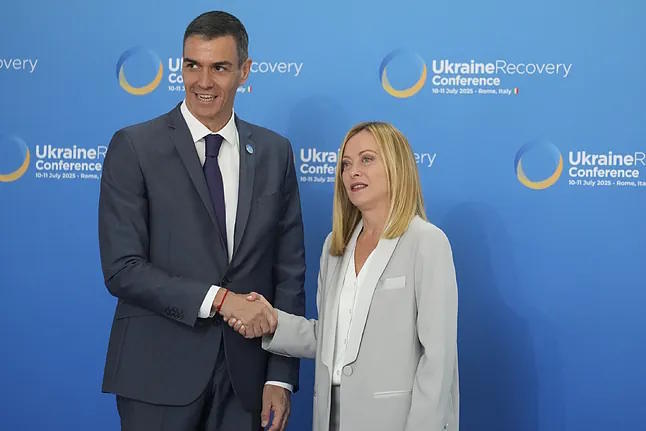The British newspaper Financial Times publishes today an extensive report titled Pedro Sánchez fights for his political life which analyzes how Spain's international position is being deteriorated by corruption in the PSOE, the confrontation with NATO allies over its refusal to increase defense spending to 5%, and the impact on the EU of Catalan separatist demands. While the Government tries to navigate these crises, "its Western allies, in the meantime, feel snubbed. And its popular support continues to falter amid the growing stench of corruption," as the text narrates, signed by the newspaper's correspondent in Spain and Portugal, Barney Jopson.
As a result, a head of Government who, it is said, thanks to his "good English and a bit of swagger" had "so far succeeded in raising Spain's global profile," finds himself in a position of international weakness. Sánchez, thus, sees how "accusations of corruption against his inner circle have discredited him domestically [in Spain]," while his confrontation with Donald Trump over NATO spending increase has put him in a complicated position internationally, "undermining his reputation abroad." The "discontent" is visible, according to the article, in Brussels, partly due to the president's attempts to "intimidate other EU member states" to accept Catalan in the EU.
The international focus is logical in the FT, as the newspaper is colloquially known, given that 70% of its readers are outside the United Kingdom, according to data from the publishing company, the Japanese Nikkei. Because, although only one of the political fronts mentioned - that of NATO - is purely foreign policy, it also reflects the impact on Spain's position in the world of the corruption of the "toxic triangle" - José Luis Ábalos, Koldo García, and Santos Cerdán - and the "complex issue of Catalan separatism" where, it points out, the head of the Government "has been subjugated to the demands of its leader, Carles Puigdemont." In the corruption scandals, the report explains that the European Commission has reminded Spain that it "has not yet begun" to work on the anti-corruption strategy it is legally obligated to develop.
This cocktail of internal problems has an impact on Spain's position in the world, which had been one of the main assets of Sánchez's management. The stance on NATO, which the FT had already criticized in advance (there is its headline from two weeks ago Pedro Sánchez undermines NATO on the eve of a crucial summit) is attributed "in part to the anti-militarism and anti-Trumpism of its base in Spain, as well as to the radical leftists of its fragile parliamentary alliance."
The same happens with the demands of Catalan separatism, which has gained power because, after the elections two years ago, Sánchez needed "the vote of the most extreme nationalist party," referring to Junts. The consequence is "a paralyzed Government in Parliament, unable to pass the Budgets or any relevant law."
The consequences of concessions to Puigdemont "explain why Sánchez is intervening in a major purchase in the banking sector," referring to the prohibition for BBVA to acquire Sabadell until 2028, "which goes against the European effort towards banking consolidation." Nevertheless, it concludes, "Puigdemont's party is not satisfied," so the crisis seems destined to perpetuate.
